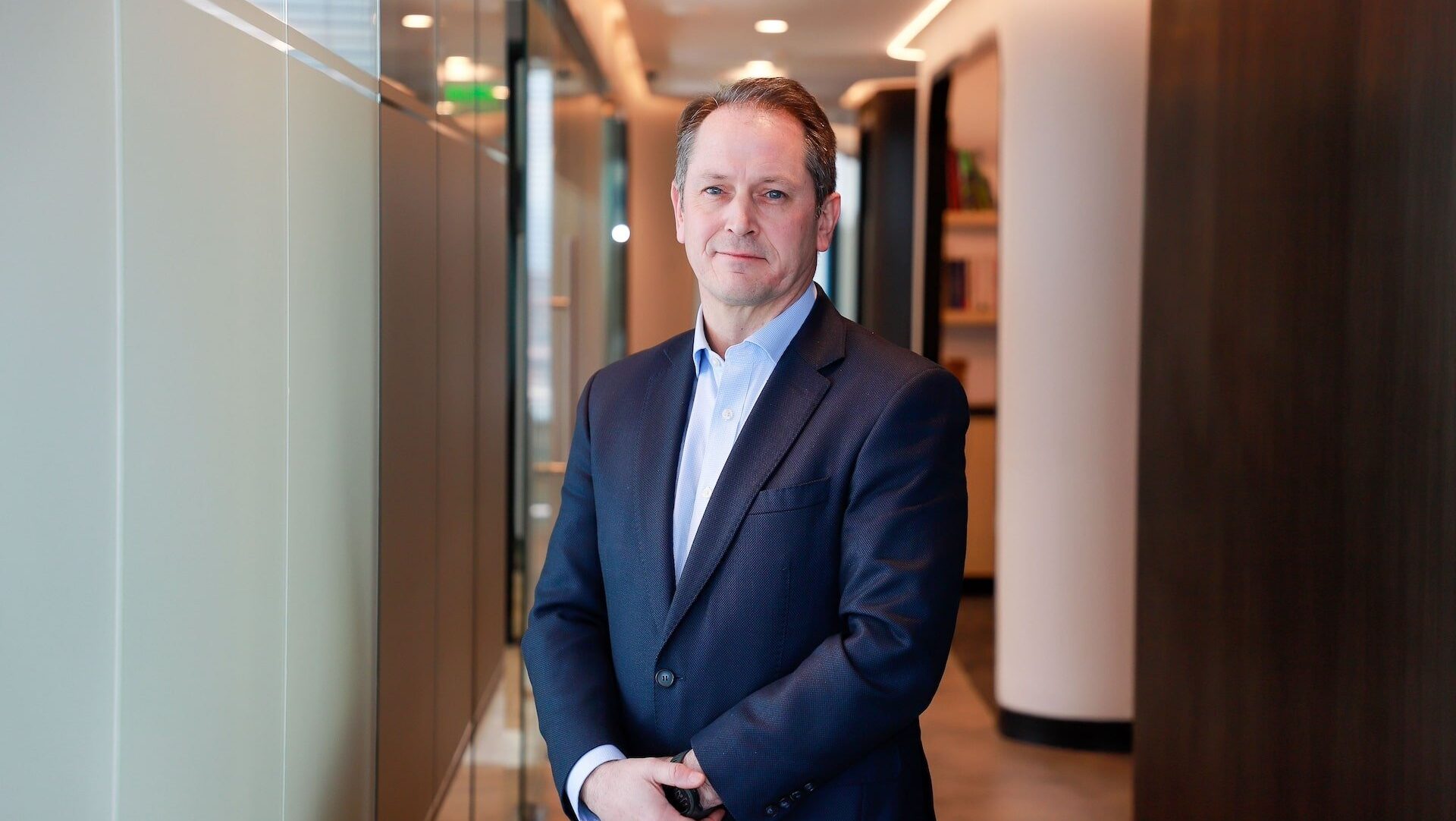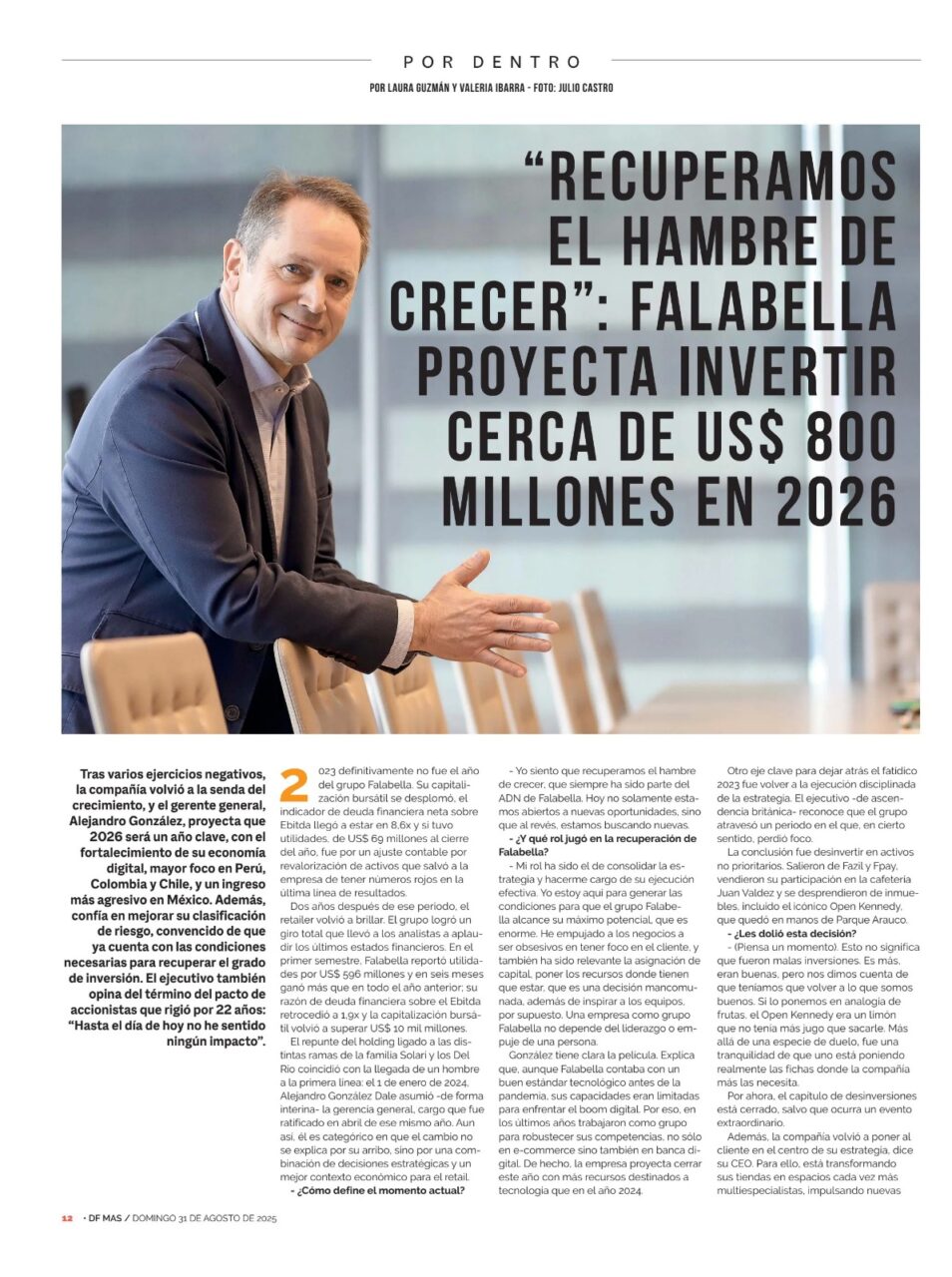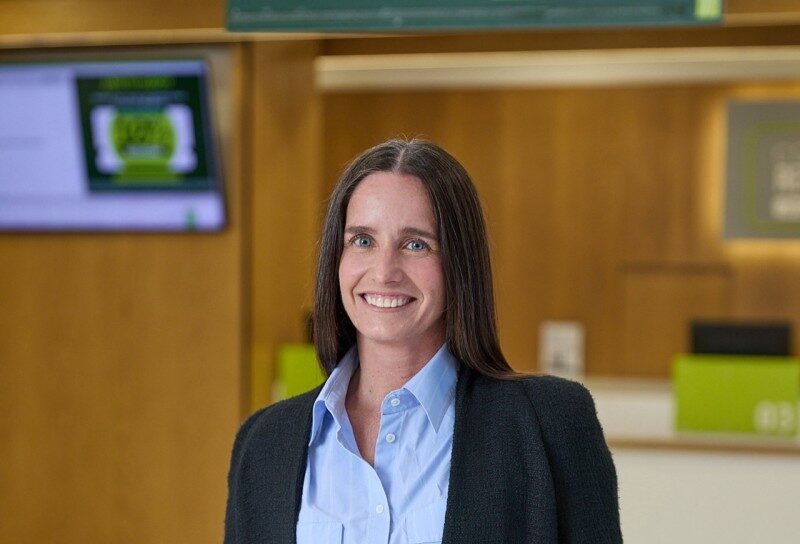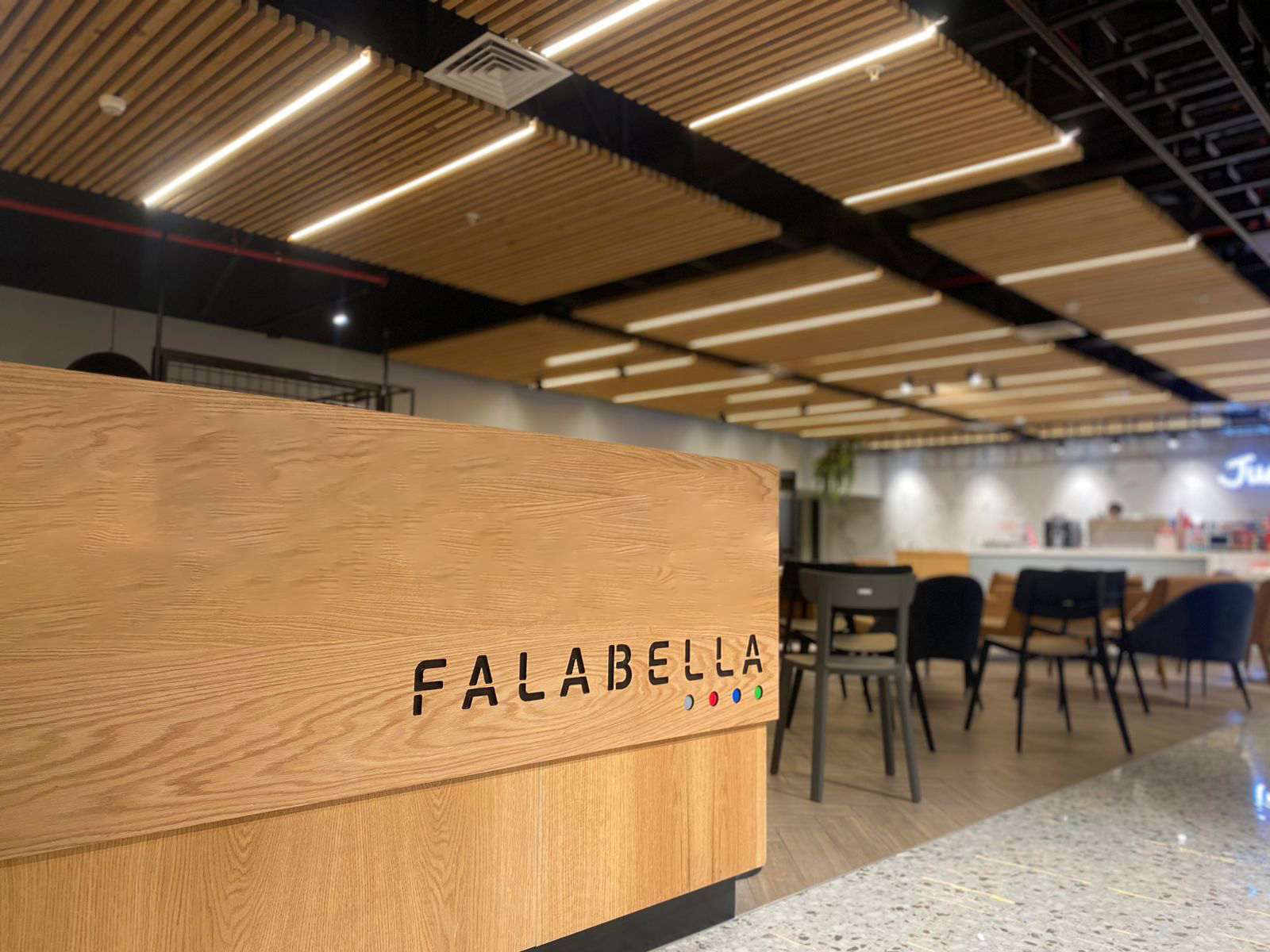
After several negative years, the company is back on the path to growth. CEO Alejandro González projects that 2026 will be a key year, with a strengthening of its digital economy, increased focus on Peru, Colombia, and Chile, and a more aggressive entry into Mexico. He also expects to improve the company’s credit rating, convinced that Falabella now meets the conditions to regain investment-grade status. The executive also commented on the end of the shareholder agreement that governed the company for 22 years: “To this day, I haven’t felt any impact.”

2023 was definitely not Falabella Group’s year. Its market capitalization plummeted, the net financial debt to EBITDA ratio reached 8.6x, and its profit of US$69 million at year-end was only due to an accounting adjustment from asset revaluation, which saved the company from posting a net loss.
Two years after that period, the retailer is shining again. The group achieved a complete turnaround that led analysts to applaud its latest financial statements. In the first half of the year, Falabella reported profits of US$596 million—earning more in six months than in the entire previous year. Its financial debt to EBITDA ratio dropped to 1.9x, and its market capitalization once again surpassed US$10 billion.
The rebound of the holding, linked to various branches of the Solari and Del Río families, coincided with the arrival of a new leader: on January 1, 2024, Alejandro González Dale took over as interim CEO, a position that was confirmed in April of the same year. Still, he is adamant that the change is not due to his arrival, but rather to a combination of strategic decisions and a more favorable economic context for retail.
How do you define the current moment?
I feel we’ve regained our hunger to grow, which has always been part of Falabella’s DNA. Today, we’re not just open to new opportunities—we’re actively seeking them.
And what role did you play in Falabella’s recovery?
My role has been to consolidate the strategy and ensure its effective execution. I’m here to create the conditions for Falabella Group to reach its full potential, which is enormous. I’ve pushed the businesses to be obsessive about focusing on the customer, and capital allocation has also been key—putting resources where they need to be, which is a joint decision, along with inspiring the teams, of course. A company like Falabella Group doesn’t depend on the leadership or drive of just one person.
González has a clear vision. He explains that although Falabella had a solid technological standard before the pandemic, its capabilities were limited to face the digital boom. That’s why, in recent years, the group has worked to strengthen its competencies—not only in e-commerce but also in digital banking. In fact, the company expects to close this year with more resources allocated to technology than in 2024.
Another key factor in moving past the difficult 2023 was returning to disciplined strategy execution. The British-descended executive acknowledges that the group went through a period where, in a sense, it lost focus.
The conclusion was to divest from non-core assets. They exited Fazil and Fpay, sold their stake in Juan Valdez coffee shops, and disposed of real estate, including the iconic Open Kennedy mall, which was acquired by Parque Arauco.
Was that decision painful?
(He pauses for a moment.) That doesn’t mean they were bad investments. In fact, they were good ones, but we realized we had to return to what we do best. If we use a fruit analogy, Open Kennedy was a lemon with no more juice to squeeze. Beyond a kind of mourning, it was reassuring to know we were truly placing our bets where the company needs them most.
For now, the divestment chapter is closed—unless an extraordinary event occurs.
Additionally, the company has refocused its strategy around the customer, says the CEO. This includes transforming stores into increasingly multi-specialist spaces, enhancing in-store experiences, and optimizing the usability of its digital platforms.
The Hunger to Grow
There’s a renewed sense of optimism in the halls of the holding. With strong results through June, the retailer is not easing off the accelerator. Before the pandemic, Falabella invested between US$800 million and US$900 million annually; the crisis forced them to cut that budget in half. For 2025, the plan increased to US$650 million, and for 2026, the ambition is even greater. Although figures are not yet finalized, González sees room to return to pre-pandemic levels—around US$800 million.
How will that budget be distributed?
It’s not fully defined yet, but there’s certainty that the digital front will remain strong, driving technological capabilities and the use of artificial intelligence.
The physical world isn’t being left behind either. Falabella will continue to strengthen its omnichannel ecosystem through its five major units—Falabella Retail, Sodimac, Tottus, Mallplaza, and Banco Falabella—and is preparing new openings, such as the store in Viña del Mar.
The investment agenda also looks beyond Chile, focusing on the Andean region. For González, Peru and Colombia—alongside the local market—hold the greatest potential. In Peru, Tottus will lead the expansion, with opportunities to open more stores; Sodimac also has room to grow. In Colombia, beyond deepening operations, attention is on the corporate structure after its major partner, Organización Corona, decided to sell all its minority stakes except in Sodimac. Falabella is evaluating options, including bringing in a new partner or acquiring Corona’s stake. The decision will take a few months.
Mexico is the other major card. Currently, through a partnership with Soriana, Falabella operates Sodimac and a credit card, but the goal is to bring the full ecosystem. Why Mexico? The executive sees it as similar to countries where they already operate, but on a larger scale.
In the Atlantic—Brazil and Argentina—the focus remains on improving profitability, without making them strategic priorities. Entering the U.S. market is also not on the radar: “It’s a completely different way of doing business than what we’re used to.”
Why those countries?
One of the things we’ve learned is to grow where we have strengths. The opportunities that can truly maximize Falabella’s potential are in Chile, Peru, Colombia, and Mexico. That’s where the value is today, and that’s where we’ll focus our energy.
With that roadmap, the holding feels ready to compete with strong newcomers like Mercado Libre and Chinese platforms Shein, Temu, and AliExpress.
The difference, says González, lies in the value proposition. Mercado Libre is a generalist marketplace; Falabella targets niches like beauty and apparel. The Asian platforms play in a different league in terms of price and quality, with a distinct target audience.
The Group’s Branches
González highlights the consistent performance of the holding’s five business units, which have recently shown improvements in both revenue and profitability. Sodimac managed to grow above consumption levels, driven by the recovery of the construction sector; meanwhile, Mallplaza is executing expansion plans in Chile and Peru totaling 86,700 m², with a global investment of US$314.6 million.
Falabella Retail remains one of the group’s engines and aims to further strengthen its omnichannel model.
Banco Falabella, meanwhile, is consolidating as a strategic business. For González, a significant portion of the group’s future value is tied to this unit, which, thanks to its digital strategy, is now recognized as one of the best banking apps in the country. The plan is to continue investing heavily in this area.
Tottus, the youngest business, also shows positive signs, though at two different speeds. In Peru, the supermarket is growing strongly, while in Chile progress has been more gradual. However, results have started to improve thanks to its private label, better operational execution, and a digital push that includes enhancements in the shopping experience and delivery.
In parallel, the group doesn’t rule out adding new locations—whether through purchases or leases—and is even exploring entry into the wholesale market.
What’s Missing and What’s Next
Not long ago, the market’s attention was on Falabella’s financial recovery. Now, with positive figures, the focus has shifted to the holding’s credit rating. At the end of 2023, the retailer was hit when Fitch Ratings downgraded its rating from ‘BBB-‘ to ‘BB+’, effectively stripping it of investment-grade status. Shortly after, S&P Global Ratings made the same move.
When do you expect to regain investment-grade status?
I don’t know, but what I do know is that we closed the second quarter with a net financial debt ratio at a very healthy level, which acts like a traffic light. At Falabella, we’re going to stay the course, and we believe we already have the necessary conditions to regain investment-grade status. When you look at the bonds Falabella has issued abroad, they’re already starting to behave as if they were investment-grade. In a way, the market is anticipating it.
When is the next review?
These are quarterly meetings. We’ve met, and we have a fairly close relationship.
Does maintaining the current rating mean higher financial costs?
So far, no, because all of this happened at a time when we were in a very solid financial position. We had no short-term debt, a good level of cash, and we were well-planned and organized.
With this improvement in results, do you aspire to become the company with the highest market capitalization in Chile again?
There are three companies very close to each other. We’re on that list, behind Latam and Banco de Chile. Personally, I care about Falabella maximizing its potential. But I wouldn’t want to be number one just because the others are doing poorly.
Another topic generating market interest is the end of Falabella’s shareholder agreement, which came to a close on July 1 after 22 years. Without that agreement, attention now turns to the impact on the group’s governance and what will happen next April, when the board is due for renewal.
What concrete effects has the end of the shareholder agreement had on the group?
So far, I haven’t felt any impact. Decisions on our board are made by majority vote. Our goal remains the same: for our retailers to sell more, for our banks to have greater lending capacity, and for risk to be well-managed.
Will the possible arrival of the Müller or Fürst families to the board change the company’s strategy?
There have indeed been changes in shareholders. That’s actually a very positive sign, because it shows that not only do we see potential, but other shareholders do too. I’m quite calm. When I talk about strategy and execution, I have broad support across the board, with only minor differences. If new people join, I imagine they’re coming to help maximize Falabella’s value. I don’t think they’re coming to do something radically different. There may be some changes, perhaps some fine-tuning.
How has your relationship been with Enrique Ostalé as chairman of the board?
Very good. We actually met a long time ago, when Falabella tried to merge with D&S. There’s strong alignment; I also have it with the rest of the board.
Some are more critical of the strategy to prioritize profitability, even if it means losing market share or delaying investments. Is that a debate at the table?
After coming out of poor results, we focused on profitability. But shortly after, we realized that this wasn’t the future of the company—it’s not what maximizes value. That’s when we shifted our focus to growth. We’re effectively executing the right strategy. In fact, this quarter we’ve sold significantly more than our competitors, our revenues are up 9%, outperforming others and gaining market share in department stores, home improvement, and 3P e-commerce.
Part of Falabella’s pain was necessary to build capabilities that now allow us to be in a much better position than we could have been. When you start growing, you can make mistakes. That’s why I value the perspectives of different board members. I feel there’s a lot of common ground today. We all want to grow.
We’re in the middle of a presidential race. How do you see it?
What’s clear is that, after a long time, there’s now political consensus that the country needs to grow again to generate prosperity for its people. I think it’s urgent that we take advantage of this momentum and succeed in creating the policies that will allow Chile to become what it has the potential to be. Hopefully, we don’t miss this opportunity—for everyone’s sake—because we know that when the country does well, Falabella Group does well.
To read the interview: portal.nexnews.cl/showN?valor=28ti94


